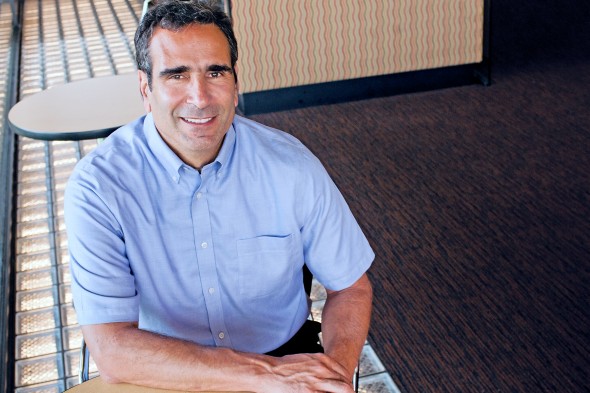Figuring a fresh take on economics

“The unifying theme is to make courses incorporate modern developments in economics and be more accessible to students,”says Steven Rivkin, head of economics. — Photo: Joshua Clark
A “Freakonomics” course isn’t the only new addition to the department of economics since Steven Rivkin became head over two years ago.
The course, based on the best-seller by Stephen J. Dubner and Steven D. Levitt, is one of several new nontechnical offerings to attract both econ majors and non-majors to the department in the College of Liberal Arts and Sciences.
The faculty has a new look. A total of 17.5 positions includes five new assistant professors — two of them added this year — and a new associate professor. “The new people are working mainly on public policy questions,” Rivkin said. “There is very little theory that goes on here.”
He also spoke of a concerted effort to include more students — undergrads and grads alike — in department research. “One of the big differences after I arrived is there are far more students working as research assistants,” said the department head. “Several undergrads are so enthusiastic about doing research that they changed their career plans to do it.”
Among other changes, undertaken after brainstorming with faculty, are ways to make economics more undergrad-friendly — such as dropping calculus as a prerequisite.
“We weren’t really using it in classes,” Rivkin said. “Courses can be rigorous in terms of ideas, but don’t have to be advanced in terms of mathematics.”
Not that math is being ignored. There is a joint course in game theory with the department of mathematics. And next spring will see the debut of an advanced quantitative methods course for undergrads.
Discussion sessions have been added to introductory classes, Rivkin said. “Before, it was three hours of lectures — now it’s three hours of lectures and one hour of discussion,” he said.
Classes include a mix of econ majors and non-majors — in health care, education, law, history — “so we’re trying to make our classes acceptable to them.”
As for “Freakonomics,” taught by professor Helen Roberts, “I hear students are having a lot of fun,” he said.
“The most important thing, the unifying theme,” Rivkin said, “is to make courses incorporate modern developments in economics and be more accessible to students, more engaging, and more in line with newer faculty.”
In addition to heading the econ department, he’s engaged in research, much of it involving education.
Rivkin is studying innovations in teacher and principal evaluation and compensation in the Dallas public schools — and, for a similar project, in the Chicago public schools. With assistant professor Marcus Casey and a grad student, he’s evaluating charter school quality in Texas. “It appears the quality of charter schools is increasing because many of the least successful are going out of business,” he noted.
Dating from time he spent in Czechoslovakia in 2011, Rivkin is looking at school quality there following the fall of communism in 1989. In a forthcoming paper for the Economic Journal, he’ll explore the link between instruction time and test scores in high school and how that relationship is mediated by classroom environment.
“It’s not surprising that there is a bigger effect in classrooms with a better environment — fewer disruptions, good relationships between students and teachers, and so on,” he said.
With four other researchers, Rivkin did a study called “Does Pollution Increase School Absences?” for the Review of Economics and Statistics. Based on data from 39 of the largest school districts in Texas, and air quality figures from the Environmental Protection Agency, they found that “a high level of carbon monoxide significantly increased the amount of absences,” he said.
The reason Texas appears in so much of his research on education is that the state “has been testing kids and collecting a lot of data since the early ’90s, ahead of anyone else,” Rivkin said. He has been director of the John F. Kain Center for Education Research at the University of Texas at Dallas since 2012.
Rivkin grew up in Lincolnwood. He studied for a year at the London School of Economics, then earned a bachelor’s degree with high honors at the University of Michigan before working for a year with the Organization of the North East, a community organization in the Uptown-Edgewater neighborhood, where he did advocacy and economic development work. His master’s and Ph.D are from the University of California, Los Angeles. He did postdoctoral studies in the urban poverty program at Northwestern University. Before starting at UIC in 2012, he was a professor at Amherst College for 18 years, including four years as chair of the economics department.
Rivkin lives in Wilmette with his wife, Hana, a graphic designer, and their daughter, Emmi, 12, and son, Jack, 10. He enjoys tennis and being outdoors, especially canoeing and skiing. “I spend a lot of time with my kids,” Rivkin said. “We play a lot of euchre.”
